Water heaters: types of water heaters and their comparative characteristics
If your home is not connected to a centralized hot water supply system, then you cannot do without a water heater.Many of us perceive the lack of hot water supply as a disaster. It’s not for nothing that water heaters are so in demand in the domestic market. They are installed in both cottages and apartments. You just need to choose the device that best suits your specific needs.
In this article we will consider the existing types of water heaters, their main characteristics, advantages and disadvantages. We will also conduct a comparative analysis of water heaters to find out which option to choose, taking into account your living conditions and your needs.
The content of the article:
Types of water heaters by energy source
Before choosing a hot water heater, you need to decide on the heat source for heating. Most often it is gas or electricity.
But units operating on liquid or solid fuel are also possible. Only such heating devices will cost more than the first two options.
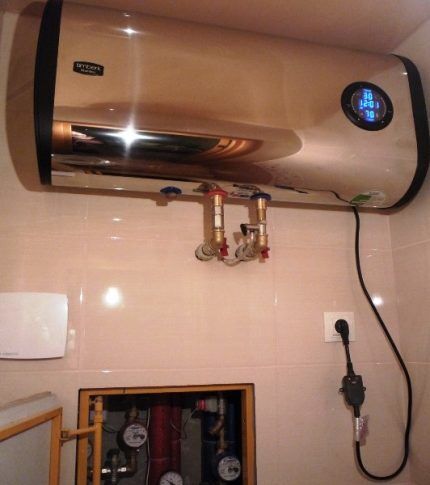
According to the type of energy carrier used, water heaters are divided into:
- gas;
- electrical;
- indirect heating.
In the first two cases, the water is heated as a result of gas combustion or the operation of a heating element. The third option is a system of a boiler and a storage boiler connected to it through a coil. In this case, the main boiler equipment in this combination can be gas, solid fuel, electric, etc.
The advantages of using gas include:
- cheap fuel;
- equipment service life is 10–15 years;
- high productivity and cost-effectiveness of equipment.
But for these advantages you have to pay with the need to invite a specialist to connect gas equipment and the obligation to install a chimney. Plus you will need a connection to a gas pipe. It is not recommended to connect the water heater from a cylinder. Bottled fuel is obviously more expensive than its pipeline counterpart.
Gas water heaters come with an open atmospheric and inflatable burner. For the former, the craving is natural, while for the latter it is forced. Any of these options requires large initial costs for equipment and installation, but then quickly pays off due to the low cost of natural gas.
The advantages of an electric water heater include:
- relatively low cost of equipment;
- light weight and small dimensions of the water heater;
- minimal risk of fires and explosions;
- possibility of self-installation of the heater.
The main disadvantage of electric water heating is the power limitation. If a water heater is required for a family of 4–5 or more people, then it is better to prefer gas appliances.
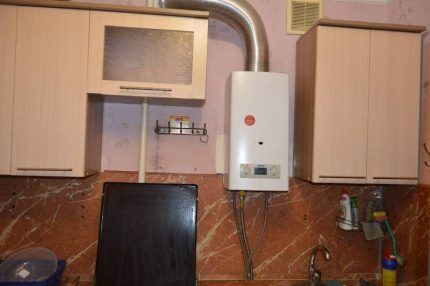
Types of water heaters by heating method
All household water heaters are divided into two types - instantaneous or storage. The former allow you to get hot water faster, while the latter are more economical.
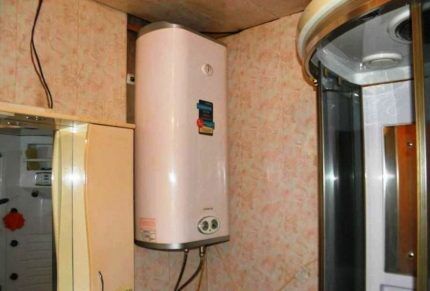
Flow heaters are distinguished by their simple design. If they operate from the mains, then it is enough to apply voltage and cold water to such a heater - and warm water immediately runs out of the tap for washing and washing dishes.
Option #1 - instantaneous type of water heater
Most often, flow heaters are found in electric version. A heating element with a large heat exchange area is installed inside them.
The advantages of an instantaneous water heater are as follows:
- Compactness of the device.
- Heating of water only at the moment of its consumption.
- Simplicity of the connection diagram for hot water supply and cold water pipes.
- There are no restrictions on the location of installation of the water heater.
- No noise during operation.
- Instant heating of used water.
But there are also on sale gas appliances similar type.
Among the disadvantages of instantaneous water heaters, the following should be mentioned:
- direct dependence on the availability and continuity of a heat source;
- lack of storage capacity;
- high probability of scale formation on the heat exchanger.
If gas or electricity stops flowing to such a heater, there will be no hot water. In the storage boiler, it is heated in advance and when the power is turned off, it remains warm inside for some time. It does not accumulate anywhere in a flow device.
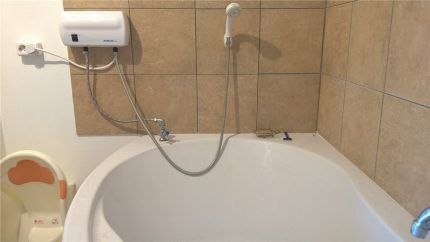
Option #2 - storage type water heater
Storage-type heaters can operate either from a centralized cold water supply or from an autonomous source of cold water. In design they resemble a heated thermos.This storage unit is thermally insulated, which allows it to retain heat for several hours without wasting energy on heating.
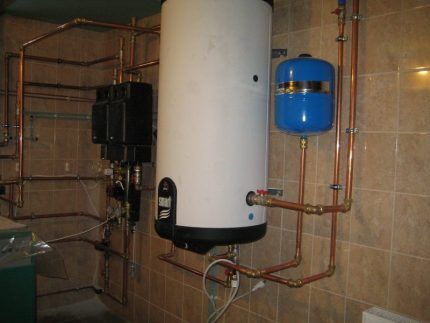
Among the advantages of storage heaters:
- efficiency and lower energy consumption;
- stability of hot water supply;
- large volume of stored and heated water.
An electric storage water heater with a capacity of 100–150 liters consumes about 1.5 kW. Heating of water in it occurs gradually, so it does not require large powers. Three-phase networks are usually not needed here. It will be enough to connect to a regular household outlet.
Storage water heaters are divided into:
- non-pressure;
- pressure
The first ones have a small tank of 10–50 liters and are designed to supply water to one or two water points. The latter are more spacious, designed only for connection to a centralized cold water supply and provide for the installation of a pump to supply hot water supply to several plumbing fixtures in the house.
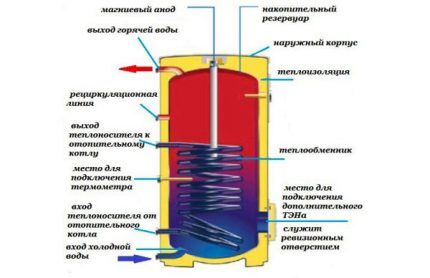
The water heater tank is made of stainless steel, coated with:
- Glass ceramics (glass porcelain).
- Titanium enamel.
- Regular enamel or glaze.
The tank with titanium enamel is the most durable. However, it also costs more than other analogues. Glass ceramics are not subject to corrosion, but at high temperatures they tend to crack, which leads to failure of the drive.
Stainless steel itself easily tolerates thermal expansion, but sooner or later it begins to rust.If the protective layer on it is cracked, then the tank can be safely changed. It won't last long after this.
We provided detailed recommendations for choosing a storage water heater in another our article.
Another mandatory element of the boiler is a magnesium anode. It protects the tank body from the inside from corrosion and scale. This is a consumable item that needs to be changed at least once a year. However, it is not recommended to save on it. Replacing it due to a malfunction of the heating element inside or the entire boiler will obviously be more expensive.
Manufacturers provide a guarantee for such a tank for 4–5 years. But if the magnesium anode is faulty or missing, then the drive will last a year at most. High temperatures and hard water will do their rusty work.
To find out more information about water heater breakdowns and how to fix them, please go to this link.
Comparison of DHW heaters
When choosing a water heater, you should compare the following model parameters in the data sheet:
- Type of energy source - electricity or gas.
- Water heating time.
- Tank volume (for storage boilers).
- Power supply characteristics (for electric water heaters).
- Capacity in liters/minute (for flow-through devices).
- The maximum heating temperature is from 50 to 80 °C.
- Type of device by location.
- Connection features.
The easiest way is to do it yourself install and connect electric flow heater with a power of up to 4–5 kW. You just need to connect a pair of hoses to the DHW inlet and DHW outlet, and then plug the device into the power supply.
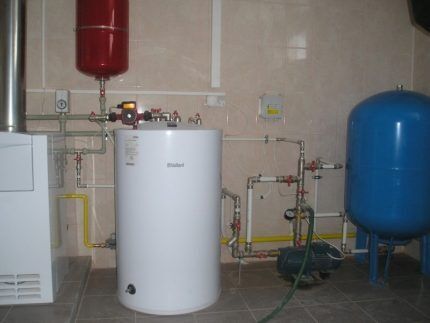
According to the method of location, water heaters are:
- horizontal;
- vertical;
- combined.
They are mounted on the wall, placed on the floor or built into cabinets. At the same time, storage boilers with a large tank are produced only in a floor-standing version. Not every wall is capable of supporting the significant weight of such hot water equipment and the water in it. We talked in more detail about installing and connecting the accumulative model in this article.
For each specific case, you can now find your optimal option. The range of modern water heaters is huge.
If you need a water heater as a safety net in case of hot water outage, then you should take an inexpensive and compact instantaneous model. Other variations in such a situation will be redundant.
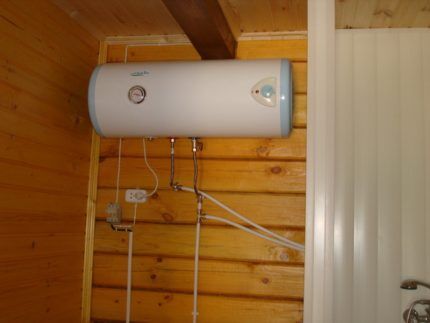
If a family consists of three people, then it will need a storage device with a capacity of 100–120 liters. In this case, it is not worth installing a flow-through device due to the high water consumption and electricity consumption. Moreover, if a water heater is needed in a large cottage and there is a gas main, then gas equipment will be unrivaled.
For a large family, you can also take a combined type boiler - a storage tank plus a flow-through heat exchanger. If the first one is completely emptied at some point, then the second one starts working in it. This avoids waiting for the tank to fill and warm up.At the same time, energy consumption is reduced due to the presence and regular use of a storage boiler.
The more powerful the water heater, the more efficient and faster it produces water at the required temperature. However, at the same time, its consumption of electricity and gas is growing. This is especially true for electric heaters. It’s one thing to connect such a device to a 220-volt outlet in the bathroom or kitchen, but quite another thing to pull a separate three-phase cable for it.
Conclusions and useful video on the topic
Pros and cons of various water heaters:
Tips for choosing and installing a water heater:
When choosing a water heater, you should focus on the volume of water consumed and the availability of a particular energy source to operate such a device..
For low water consumption, a flow-through electric heater will be sufficient. But for a large family, it is best to install a gas storage analogue in the cottage.
What type of water heater do you use? Are you satisfied with its performance or are you thinking about replacing it?
If you are just choosing a suitable water heater option for yourself and want to clarify a number of nuances, ask questions to our experts and other site visitors in the comments block under this article.
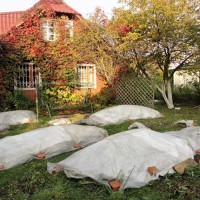


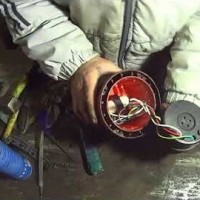
Nothing better than a gas water heater or a double-circuit boiler has yet been invented. However, if there is no gas or the project does not provide for it, it is better to install a simple storage electric water heater with a capacity of 100–150 liters to help. For example, I already have a second tank for 150 Gorenje, the first one ran out from old age - it worked for 12 years and started leaking. Now I have purchased a composite one.My parents have gas - here, of course, everything is more positive, from the speed of warming up to the cost of energy resources.
I would also consider the high energy consumption to be a disadvantage of an electric boiler. If for rural areas, where tariffs are half as much, this is quite acceptable, then for the city it is still relatively expensive. The boiler tank also needs periodic cleaning, especially if the water is not very good. As for gas options, they do not seem entirely safe.